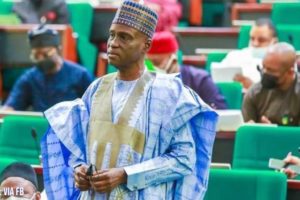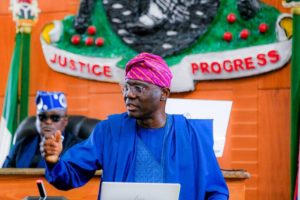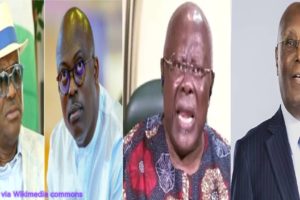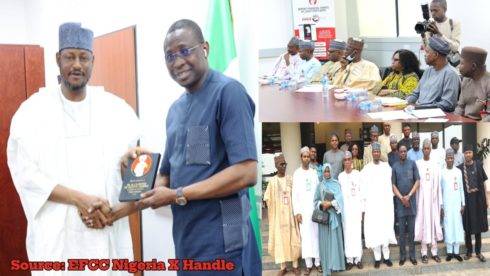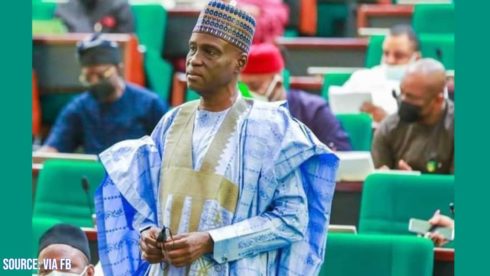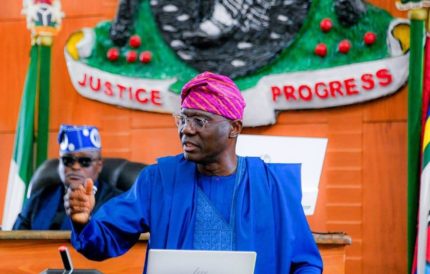Mr Ola Olukoyede, the Executive Chairman of the Economic and Financial Crimes Commission (EFCC), has emphasized the need for systemic changes to combat corruption effectively. Speaking during a courtesy visit by senior officials of the Katsina State Government, led by Governor Dikko Umaru Radda, Mr Ola Olukoyede highlighted the intrinsic integrity of Nigerians, stating that corruption thrives due to flawed institutional systems. He underscored the importance of correcting these systems to foster a culture of transparency and accountability.
Mr Ola Olukoyede’s call for systemic change resonates with the growing recognition that tackling corruption requires more than just punitive measures—it demands structural reforms to prevent corruption at its roots. By acknowledging the role of flawed systems in perpetuating corruption, Mr Ola Olukoyede advocates for a holistic approach to address the issue, aiming to create an environment where integrity flourishes.
Mr Ola Olukoyede Identifying Institutional Weaknesses
According to Mr Ola Olukoyede, corruption in Nigeria is not a product of innate moral failings but rather a consequence of institutionalized deficiencies. He pointed out that existing systems are susceptible to corruption, suggesting that even individuals with good intentions can be corrupted by these flawed structures. This recognition of institutional weaknesses is crucial in devising targeted strategies to reform governance frameworks and enhance transparency.
By identifying specific institutional weaknesses, such as budgetary implementation and financial regulations, Mr Ola Olukoyede underscores the importance of addressing root causes rather than merely treating symptoms. This approach aligns with international best practices in anti-corruption efforts, which emphasize the need for systemic reforms alongside enforcement measures.
Mr Ola Olukoyede Gave Commendation for Progressive Initiatives
While advocating for systemic change, Mr Ola Olukoyede commended Governor Radda for his proactive initiatives aimed at promoting transparency and accountability in Katsina State. He praised the establishment of the Fiscal Responsibility Commission and the implementation of the Treasury Single Account (TSA) as significant steps towards enhancing financial discipline. This recognition highlights the importance of leadership commitment in driving anti-corruption reforms at the state level.
By acknowledging and supporting progressive initiatives, Mr Ola Olukoyede encourages other states to emulate Katsina’s example and prioritize governance reforms. This positive reinforcement not only motivates existing efforts but also fosters a culture of accountability across different levels of government.
Partnership for Capacity Building
Governor Radda expressed his administration’s commitment to partnering with the EFCC in the fight against corruption and sought capacity building support for state officials. He emphasized the importance of equipping financial managers with the necessary skills to identify and address leaks in the state’s finances. This emphasis on capacity building reflects a proactive approach to strengthening institutional capabilities in anti-corruption efforts.
The collaboration between the Katsina State Government and the EFCC signifies a shared commitment to combatting corruption through collaborative and mutually beneficial partnerships. By leveraging the expertise of the EFCC, state officials can enhance their knowledge and skills in detecting and preventing financial crimes, thereby contributing to more effective governance.
Prioritizing Transparency and Accountability
Governor Radda reiterated the significance of transparency and accountability in governance, particularly in the management of limited resources. He emphasized the need to safeguard public funds and ensure their efficient utilization for development purposes. This emphasis on prioritizing transparency and accountability underscores the broader goal of promoting good governance and fostering public trust.
By prioritizing transparency and accountability, Governor Radda demonstrates his administration’s commitment to responsible stewardship of public resources. This commitment not only strengthens the state’s resilience against corruption but also enhances its attractiveness for investment and development partnerships.
Collaborative Efforts for Sustainable Development
The visit by Governor Radda and his delegation symbolizes a collaborative effort between the Katsina State Government and the EFCC towards achieving sustainable development goals. It underscores the importance of partnerships between government agencies and anti-corruption bodies in addressing systemic challenges and fostering a culture of integrity. This collaborative approach is essential for achieving long-term progress in the fight against corruption and promoting inclusive growth and development.
Overall, the dialogue between the EFCC and the Katsina State Government exemplifies a proactive and collaborative approach to tackling corruption and promoting good governance. By prioritizing systemic reforms, capacity building, and partnership, both entities aim to create an environment conducive to transparency, accountability, and sustainable development.
Table of Contents
Discover more from OGM News NG
Subscribe to get the latest posts sent to your email.

